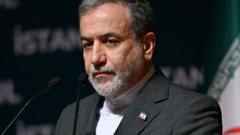As the U.S. car industry grapples with new tariffs, analysts predict potential cost increases for consumers while companies adjust strategies for production amidst a shifting policy landscape.
**New Tariffs Imposed on U.S. Car Parts: Industry Faces Uncertain Future**

**New Tariffs Imposed on U.S. Car Parts: Industry Faces Uncertain Future**
A 25% tariff on key car parts has been implemented in the U.S., raising concerns among automakers and consumers alike.
The U.S. has officially introduced a 25% import tax on essential car components such as engines and transmissions, exerting additional pressure on an automotive sector already navigating a series of regulatory shifts. This new tariff follows President Donald Trump's earlier decision to relax related measures, though he stopped short of fully eliminating the existing tariffs on certain imported vehicles and parts.
The administration suggests that these tariffs are designed to incentivize domestic car manufacturing. However, industry experts caution that rather than fostering immediate growth in U.S. production, the changes might merely shift manufacturing efforts elsewhere and contribute to increased operational costs, ultimately cascading into higher prices for consumers.
Currently, automotive companies seem to be supported by a surge in sales, as fears of rising prices motivate consumer purchases. Notably, General Motors and Ford have reported substantial sales growth in April. Yet, GM anticipates an additional burden of up to $5 billion this year due to these tariffs, expecting to face $2 billion in charges for vehicles brought in from its South Korean plants.
Executives now forecast a price increase of approximately 1%, contrary to earlier predictions of decreases. In an indicator of uncertainty, Stellantis, the parent company of Jeep, Fiat, and Chrysler, has rescinded its financial guidance for the upcoming year, prompting caution from leadership regarding future planning. CFO Doug Ostermann highlighted the "extreme uncertainties" impacting the industry.
Approximately 50% of vehicles sold in the U.S. last year were imported, which underscored the critical implications of Trump’s tariffs announced earlier this year. This policy immediately prompted reactions from companies, flagging concerns about increased costs and potential sales limitations.
Despite revisions that have relaxed some duties, particularly for parts manufactured under the pre-existing free trade agreements with Canada and Mexico, industry stakeholders still feel the impact of the sweeping tariff policy. Customs updates suggest that these exemptions may become permanent, easing some of the burden.
In response to the tariffs, manufacturers like GM have increased production capabilities in U.S. facilities, including a notable expansion at a plant in Indiana where truck production was ramped up by 50,000 units. Meanwhile, some companies, like Mercedes-Benz, are also eyeing expansion opportunities in existing factories within the U.S.
Cornell University’s Art Wheaton expressed skepticism about the establishment of additional factories in the United States given the turbulent market conditions. "Multi-billion-dollar decisions cannot be based on such instability," he remarked.
The U.S. government is reportedly pursuing new trade deals with critical automotive partners such as South Korea and Japan. Analysts like Wheaton note that future policy adjustments from Trump may occur if signs of economic backlash become apparent, particularly as they note that the full effects of the tariffs may not yet be realized. "The current market seems stable, but the true impact may still be on the horizon," he concluded.
The administration suggests that these tariffs are designed to incentivize domestic car manufacturing. However, industry experts caution that rather than fostering immediate growth in U.S. production, the changes might merely shift manufacturing efforts elsewhere and contribute to increased operational costs, ultimately cascading into higher prices for consumers.
Currently, automotive companies seem to be supported by a surge in sales, as fears of rising prices motivate consumer purchases. Notably, General Motors and Ford have reported substantial sales growth in April. Yet, GM anticipates an additional burden of up to $5 billion this year due to these tariffs, expecting to face $2 billion in charges for vehicles brought in from its South Korean plants.
Executives now forecast a price increase of approximately 1%, contrary to earlier predictions of decreases. In an indicator of uncertainty, Stellantis, the parent company of Jeep, Fiat, and Chrysler, has rescinded its financial guidance for the upcoming year, prompting caution from leadership regarding future planning. CFO Doug Ostermann highlighted the "extreme uncertainties" impacting the industry.
Approximately 50% of vehicles sold in the U.S. last year were imported, which underscored the critical implications of Trump’s tariffs announced earlier this year. This policy immediately prompted reactions from companies, flagging concerns about increased costs and potential sales limitations.
Despite revisions that have relaxed some duties, particularly for parts manufactured under the pre-existing free trade agreements with Canada and Mexico, industry stakeholders still feel the impact of the sweeping tariff policy. Customs updates suggest that these exemptions may become permanent, easing some of the burden.
In response to the tariffs, manufacturers like GM have increased production capabilities in U.S. facilities, including a notable expansion at a plant in Indiana where truck production was ramped up by 50,000 units. Meanwhile, some companies, like Mercedes-Benz, are also eyeing expansion opportunities in existing factories within the U.S.
Cornell University’s Art Wheaton expressed skepticism about the establishment of additional factories in the United States given the turbulent market conditions. "Multi-billion-dollar decisions cannot be based on such instability," he remarked.
The U.S. government is reportedly pursuing new trade deals with critical automotive partners such as South Korea and Japan. Analysts like Wheaton note that future policy adjustments from Trump may occur if signs of economic backlash become apparent, particularly as they note that the full effects of the tariffs may not yet be realized. "The current market seems stable, but the true impact may still be on the horizon," he concluded.




















